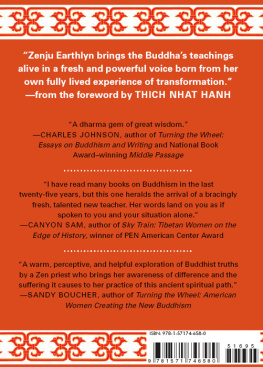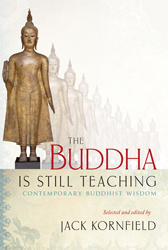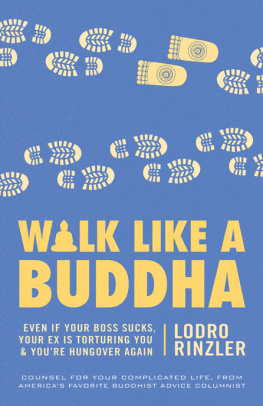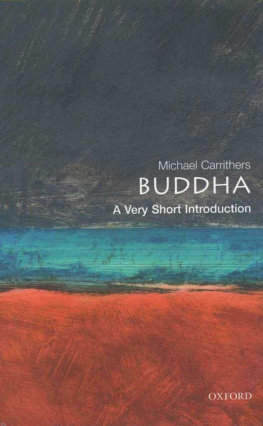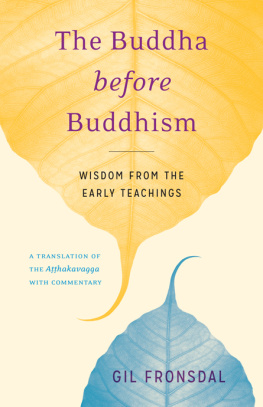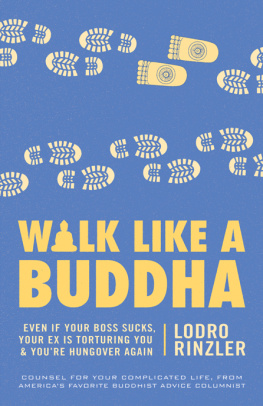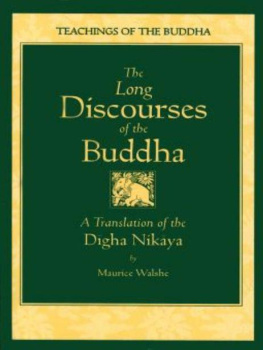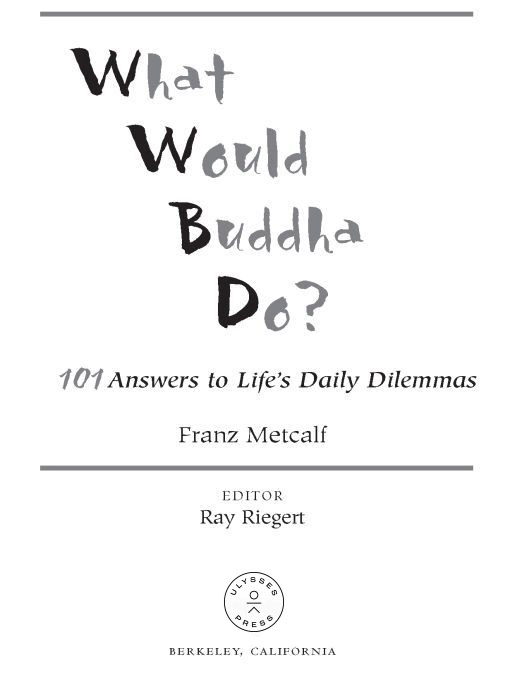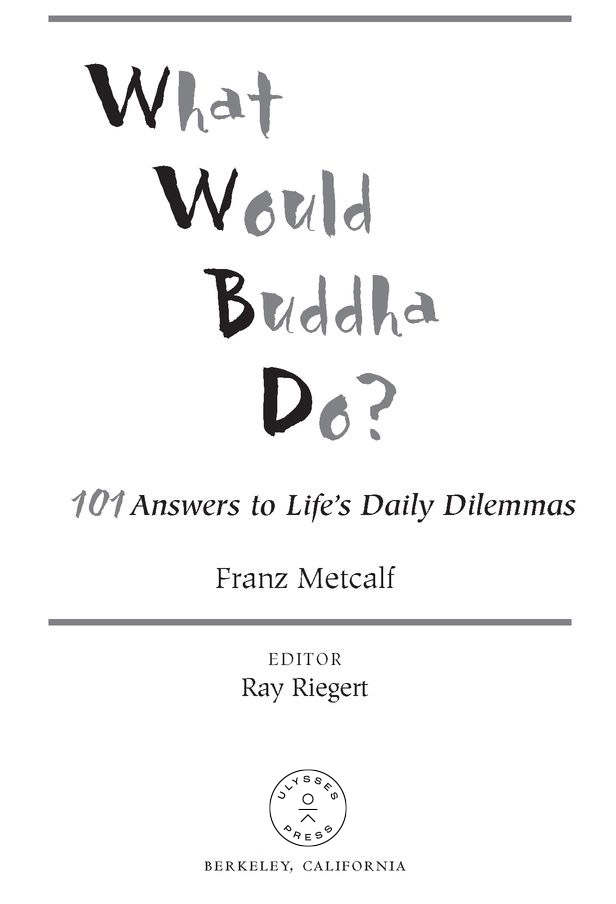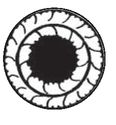Table of Contents
As I hope youll see in reading it,
I dedicate this book to the Buddhas within,
yearning for us to give them birth.
Namo tassa bhagavato arahato sammasambuddhassa.
Acknowledgments
Ive often wondered why authors always have acknowledgment pages. Theyre not really for the general reader, since reading them is like going to a party where you dont know anyone. I now know the point of these pages: We all build up friendly debts in life, but we dont always have the pleasure of paying them back directly. In acknowledgments we do, and it is a great pleasure. Welcome to the party.
For this book, without qualification and from its birth, I thank Leslie Henriques, Ray Riegert and Bryce Willett for their innumerable gifts and labors, and Phil Abrams for being born. For their work, especially in the last, hectic weeks, I thank Claire Chun, Heather McCann, Steven Schwartz and the whole charming staff at Ulysses Press.
This is not an academic book, so I had better not incriminate any scholars here, but Buddha knows what theyve done to guide me. I do thank Daniel Capper for his advice on Tibetan texts. Dan led me to the Dalai Lamas book, Kindness, Clarity, and Insight, and I thank Snow Lion Press for allowing me to quote from it here.
First and last, for me there is always Nina. First to encourage me, last to make edits, always my bunkie Buddha.
Introduction
What would Buddha do? He was, after all, a person like us. He struggled with life just as we do, and he discovered lifes deepest secrets. What better role model could we desire? Picture yourself facing a personal conflict or moral dilemma; ask yourself, what would Buddha do if he were in my shoes?
What would Buddha do? is a great question, helpful and reassuring. But how do we answer this questionnot only once, but in the trials of life? The endless richness of the Buddhist tradition provides so many answers, so many modelshow do we locate them and choose those that might help?
This question, What would Buddha do? has recently been made more powerful by the What Would Jesus Do? phenomenon, a nationwide movement that encourages individuals, when facing a personal conflict or moral dilemma, to ask themselves, What would Jesus do? Its a powerful question, one that can change lives.
To ask such a question is to give yourself the moment of reflection it takes to find an answer. Buddhists have been doing this for 2500 years. In discovering what Buddha would do, they have plumbed a deep reservoir of practices, texts, rituals and myths.
I have drawn from this same well of Buddhist wisdom to answer the central question of what Buddha would do when faced with the many trials of our contemporary life. This book looks to the whole current of Buddhist tradition for that help, from the earliest stories of Buddhas life to the insights of awakened masters who continue the tradition today.
Who is Buddha? or, Who are You?
The historical Buddha, who lived in what is now Nepal and India, was a real persona man who overcame desire, hatred and ignorance. Buddhism, the religion that follows his teaching, has looked back to him as an exalted teacher, even a perfected man, but never as a god. Whatever fantastic powers have been attributed to Buddha, he remains human.
Buddha was a psychologist, and called himself a doctor more than once. During his long teaching career he dispensed the medicine of insightinsight into our human problems and how to transcend them. He broke down the distinction between psychologist and religious teacher. And he created a system of thoughtthe Buddhist traditionthat provides very helpful and surprisingly contemporary answers to the questions each of us faces today.
Though Buddha was a historical figure, this does not exhaust the many meanings of his name. The word has come to signify not just the historical Buddha, but awakening itself, the Buddha Mind. This Buddha Mind is at once transcendent and within each of us at every moment. Just as Buddha pervades the universe, so Buddha Nature pervades us as well, making each of us, in a sense, a Buddha.
If we are Buddhas already, what is it we have to learn? Why do we still feel frustrated and disappointed? Perhaps this is because we havent yet realized we are Buddhas. We wont realize this by indulging ourselves; we need to follow the Buddhist path leading away from the self. When we stop guiding our lives by the desires of the self, we will quite naturally live as the Buddhas we already are.
So easy to imagine, so hard to accomplish! But weve all had moments of awakening when we lived not for ourselves, not in ourselves, but in a wider, deeper flow of being. This is our real nature coming out, breaking through the crust of ego and consciousness we have layered upon it over the long days of our lives. We can all be Buddhaswe are all Buddhaswhen we act as Buddha.
Whats in this Book
This book aims to help you be the Buddha you are, to find your own Buddha Nature and allow that Nature to guide you through life. The Buddha in you is your best teacher. Hopefully, the questions and answers here will help you bring that Buddha to life.
The books structure is simple: it asks 101 questions we face in living our lives. Every question is answered by Buddhain words found in the sacred texts of Buddhismand by a contemporary explanation of how to apply this teaching to our own lives.
Will applying these lessons really work for you personally? I think so. Its worked for me, and I am not a card-carrying Buddhist. Though I teach Buddhism at a college, I dont belong to any Buddhist organizations and I dont chant or meditate every day. But I love Buddhism, its wisdom, and the ways it helps me be a better person. I have found that Buddha and the whole Buddhist tradition speak directly to me without demanding that I give up my freedom.
This book encourages you in your freedom. Dont just read ituse it in your own way. Whether you read it slowly for insight or turn to it under stress for advice, I hope you feel free to make it your own. Buddha asked his followers to test his words. I invite you to test these.
Whats Wrong with Me?!
Tough title, I know, but we dont become better people by congratulating ourselves on our good points.Would you be reading this book if you were content to let yourself simply stay the way you were? As Buddha might tell you, youve got to keep changing. Even the deepest pool stagnates without action.
This section of the book concentrates on our typical human faults. But thankfully, Buddha does not merely chronicle our many failings, he lays out their origins and gives us clues for their eradication. I mean that literally: eradication means pulling up roots. Our faults are like weedsif we really want to get rid of them we cant just take off their tops, we have to rip them out by their very roots. Taking out the root of suffering: this is what Buddha strove to embody and teach.


